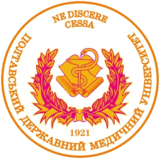Please use this identifier to cite or link to this item:
http://repository.pdmu.edu.ua/handle/123456789/14404| Title: | Когнітивна лінгвістика як напрям мовознавчого дослідження |
| Authors: | Шевченко, Олена Миколаївна Шевченко, Наталія Сергіївна Shevchenko, Olena Shevchenko, Nataliia |
| Issue Date: | 2020 |
| Citation: | Шевченко О. М. Когнітивна лінгвістика як напрям мовознавчого дослідження / О. М. Шевченко, Н. С. Шевченко // Молодий вчений. – 2020. – № 7.1. (83.1). – С. 142–146. |
| Abstract: | У статті узагальнено теоретичні дані щодо апарату когнітивної лінгвістики у сучасному мовознавстві. Сформульовано її об’єкт, предмет, мету, методологію та вихідні принципи, а також визначено її місце у системі сучасних досліджень. З’ясовано, що об’єктом когнітивної лінгвістики є когніція в її мовному відображенні. Предметом її вивчення є такі моделі репрезентації знань і уявлень людини про навколишній світ як картина світу, фрейм, стереотип, архетип, концепт, а також способи їхньої вербалізації. Окреслено напрями когнітивних досліджень: теорія когнітивних моделей (фреймова семантика), теорії концептуальної метафори та концептуальної метонімії, когнітивна фонологія, когнітивна теорія літератури (когнітивна поетика) та їх основні представники. Особливу увагу було присвячено лінгвоконцептології, одній з основних галузей когнітивної лінгвістики. The article determines the basic notion of cognitive linguistics. Its subject, aim, methodology and initial principles are formulated. The place of cognitive linguistics in the system of modern research is determined. It has been found that the object of cognitive linguistics is cognition in its linguistic reflection. The subject of her study is such models of representation of knowledge and ideas of the person about the world as a picture of the world, a frame, a stereotype, an archetype, a concept, as well as ways of their verbalization. The authors called the conceptual analysis method the main method of cognitive linguistics. The authors of this article try to analyze the peculiarities of the development of cognitive linguistics in linguistics and to determine its place in the system of modern research. Objectives of the article are: to analyze the research devoted to the consideration of cognitive linguistics and outline the directions of cognitive research. The directions of cognitive studies are outlined: theory of cognitive models (frame semantics), theory of conceptual metaphor and conceptual metonymy, cognitive phonology, cognitive theory of literature (cognitive poetics) and their main representatives. The authors highlighted the main discussion problems of modern linguoconceptology: differentiation of concept; dependence of the concept on language verbalization; qualification of concepts in the ways of their formation; communication of concept and meaning; the presence in the concept of evaluation-emotional, value and pragmatic components; difference of concept in individual consciousness or collective; typology of concepts; structure of concepts; methods for its description and analysis, etc. Particular attention was paid to linguoconceptology, as one of the main branches of cognitive linguistics. |
| Keywords: | мова когнітивна лінгвістика концепт поняття когнітивна семантика граматика фонологія стилістика лінгвоконцептологія language cognitive linguistics concept definition cognitive semantics grammar phonology stylistics linguoconceptology |
| UDC: | 81’23 |
| DOI: | : https://doi.org//10.32839/2304-5809/2020-83.1-36 |
| URI: | http://repository.pdmu.edu.ua/handle/123456789/14404 |
| Appears in Collections: | Наукові праці. Кафедра українознавства та гуманітарної підготовки |
Files in This Item:
| File | Description | Size | Format | |
|---|---|---|---|---|
| Cognitive_linguistics.pdf | 232,59 kB | Adobe PDF | View/Open |
Items in DSpace are protected by copyright, with all rights reserved, unless otherwise indicated.



